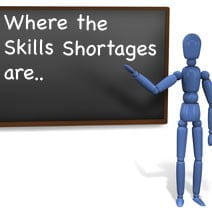Despite the on-going economic stagnation – there are employment opportunities and certain skills shortages in Ireland. The language associated with austerity and the downturn often cloud the good news stories that tell us of job prospects; growing direct foreign investment and predicted future economic growth. The economy actually did return to growth last year – for the first time in nearly four years. Whilst there continues to be job losses and some would even go as far as to say a haemorrhage; there also is a job growth – a growth associated with certain sectors and industries. Therefore, if one was to remove the spotlight from job losses to job opportunities – things might look more optimistic for the future. Lamenting job losses and lack of job prospects in certain industries is futile and wastes energy; energy needed for new reactions to a changing employment market.
While obvious, the key to finding jobs is by searching in all the right places and acquiring skills and qualifications that are relevant to those places/companies/sectors. Yes, interest in a particular job is important for numerous reasons like productivity and mental health; but within any given sector there are many diverse positions, that might suit both your interests and your skills. Also, lack of skills for a position of interest can be worked on via up-skilling or re-training from the numerous trainers out there – both private and public.
Growing direct foreign investment from multinationals like Apple, along with a number of expansions announced by high-profile companies, guarantees job vacancies now and in the future. Currently, some companies are looking outside of Ireland to fill high-profile positions because there are simply not enough qualified people here in Ireland. A lot of these positions are in specialised sectors but with existing and predicted skills shortages in these sectors – paying attention is advised.
The Expert Group on ‘Future Skills Needs’ recently announced that The Irish job market has a demand for people with work experience, third-level qualifications and/or foreign-language. Their most recent report, which outlines the areas where job vacancies arose during 2011, also highlights vacancies in occupations that are proving difficult to fill with suitably qualified and/or experienced staff, which includes: ICT professionals, financial experts, engineering experts and healthcare professionals. The most-advertised positions were in sales and ICT, and third-level qualifications were a prerequisite. Foreign languages, particularly German and Nordic languages, continued to be in demand.
Those in the business of recruitment say that current skills shortage and predicted skills shortage can be found in the following industries: technology, medical device manufacturing, pharmaceuticals, engineering, financial services, banking, accountancy and sales/customer services.
The government is addressing the skills shortages by placing emphasise on people being up-skilled or retrained in certain areas. Springboard is one example of an initiative that provides 6,000 funded part-time placements on 200 courses nationwide for unemployed people looking for work. The Government led ICT Action Plan announced a doubling of third-level education places until 2018. There are also up-skilling and re-skilling opportunities for job seekers through the ICT skills conversion programme.
As we all know; the potential for job growth coming from cloud computing is well-documented. Ensuring that there is a properly skilled workforce there to benefit from that is the latest challenge for industry and policy leaders. With Microsoft, IBM, Amazon and many others basing cloud centres in Ireland, the country has done well in its attempts to become a global force in the area. However, with many ICT companies already uneasy about the lack of skilled talent in Ireland and many jobs already going unfilled; these up-skilling courses might address this need.
In terms of what jobs have the biggest earning power; IT is the career that carries the enviable salary. In fact employees in IT, sales, engineering and accounting/finance are named as Ireland’s biggest earners. A recent survey by irishjobs.ie revealed that over a quarter of IT workers are earning at least 60,000 euros or over and those earning above 60,000 per annum are mainly found in this sector.
The Future Skills Needed reports and other related data gives those who are looking at education/training options or making career choices a view of what employers are looking for. It also provides insights for career guidance professionals, education/training providers and policy makers. The government’s job is to try and encourage people to avail of the opportunities for up- skilling and skills conversion that are available and also to counteract the recent controversial ERSI report that went as far as to say that 44% of working families with children were better off on the dole. As a job hunter – your job is to avail of all the opportunities and information available to you, to ensure you are ‘Job-Ready’ and aware of where the jobs actually are.
